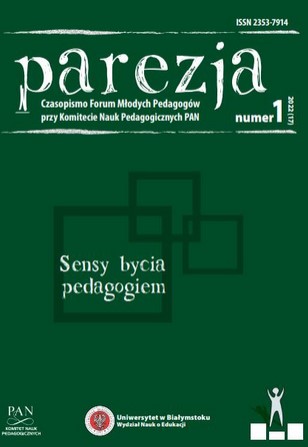Girls Empowerment! Wspieranie mocy dziewcząt i młodych kobiet w międzykulturowej edukacji pozaszkolnej
Girl Empowerment! Supporting the Power of Girls and Young Women in Intercultural Out-of-School Education
Author(s): Magdalena Anna ReichardtSubject(s): Gender Studies, Sociology of Culture, Sociology of Education, Pedagogy
Published by: Wydawnictwo Uniwersytetu w Białymstoku
Keywords: intersectionality; pedagogy of the present; emancipation; empowerment; friendship; solidarity;
Summary/Abstract: The article shows selected aspects of “the pedagogy of empowerment” aimed at girls and young women, alongside proposing methods for a successful transfer of attitudes, knowledge, and skills in this field. In the paper, learning processes are seen from an intersectional perspective, and serve to counteract cultural, structural, and systemic discrimination and unequal power relations. The considerations are based on the experiences gathered during Polish-German projects, as well as those relating to the functioning of day-care centres for girls in the federal state of Brandenburg (Germany), both of which have been the subject of the author’s action research over the last ten years. The text is aimed at educators, parents, girls, young women, and disseminators of ideas who are active in the field of non-formal, school and out-of-school education and who wish to support the empowerment of young people. Key in these learning processes are attention and sensitivity to individual needs and biographical complexities (understood as a set of life circumstances) while remaining perceptive and supportive of the group process. In the discussed learning processes, bonding, friendship, solidarity, consensual communication, free and critical thinking, awareness of possibilities and the ability to apply different kinds of strategies in life, as well as the ability to “perceive oneself in the present moment and place”, become particularly important. One might call this approach a “pedagogy of the present”, as it addresses situations and relationships pertinent to the here and now, rather than the distant indefinite future. As an example of this approach, the article presents the methodology used during an annual one-week German-Polish sailing trip organised for girls and young women.
Journal: Parezja. Forum Młodych Pedagogów Przy Komitecie Nauk Pedagogicznych PAN
- Issue Year: 17/2022
- Issue No: 1
- Page Range: 85-94
- Page Count: 10
- Language: Polish

